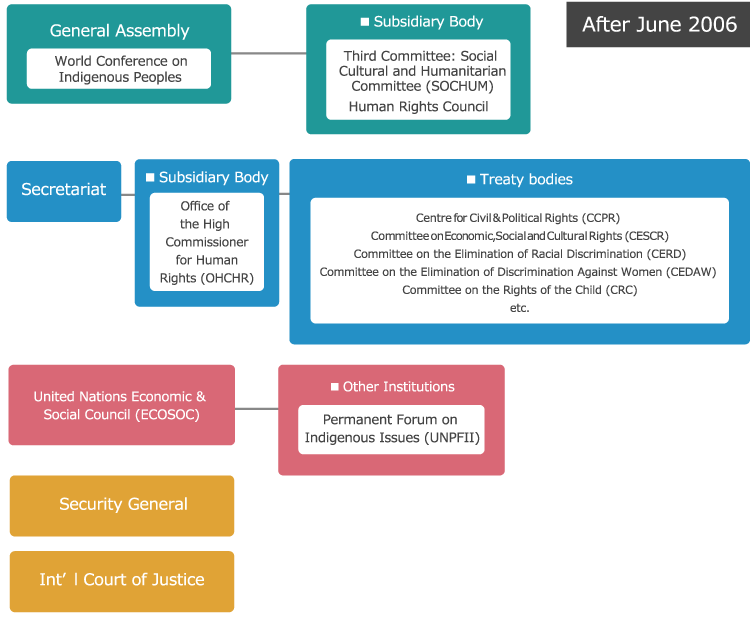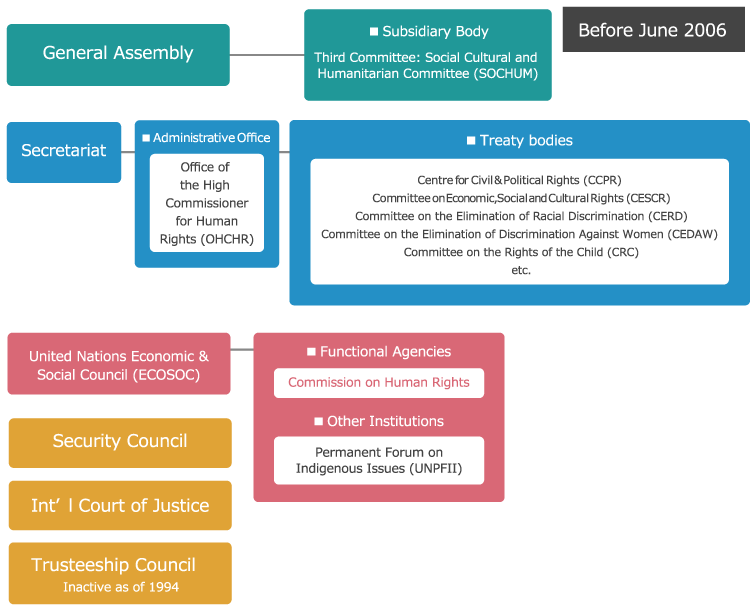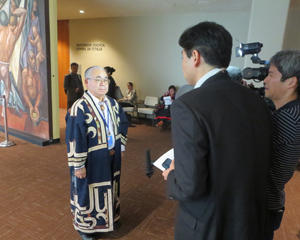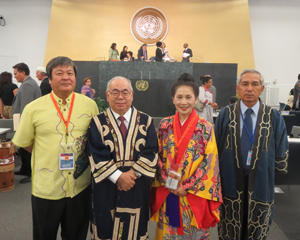- Home
- The Ainu and the United Nations
- U.N. Organization Chart on Indigenous Issues
United Nations Organization Chart on Indigenous Issues

Commission on Human Rights (UNCHR)

Established as Functional Commission to adhere to the function of the Economic and Social Council (ECOSOC) of making “recommendations for the purpose of promoting respect for, and for observance of human rights and fundamental freedoms for all.” (UN Charter Article 62)
In 1947, UNCHR established Sub-Commission on Prevention of Discrimination and Protection of Minorities as its subsidiary body (1999- Name changed to Sub-Commission on the Promotion and Protection of Human Rights). From 2006 functions and powers of the Sub-Commission transferd to the Human Rights Council.
Sub-Commission on the Promotion and Protection of Human Rights
Active as from 1947 to 2006.
This Sub-Commission had the following powers and functions
(a) Undertake studies on human rights issues and make recommendations to the Commission concerning the prevention of discrimination of any kind relating to human rights and fundamental freedoms and the protection of racial, national, religious and linguistic minorities
(b) Carry out any other functions entrusted to it by the Council (ECOSOC) or the Commission (UNCHR)
Main Special Rapporteurs were Mr. Hernán Santa Cruz Barceló and Mr. José Martinez Cobo.
The Sub-Commission established the Working Group on Indigenous Populations in 1982 and established the Working Group on draft Declaration on the Rights of Indigenous Peoples in 1995.
This Sub-Commission had the following powers and functions
(a) Undertake studies on human rights issues and make recommendations to the Commission concerning the prevention of discrimination of any kind relating to human rights and fundamental freedoms and the protection of racial, national, religious and linguistic minorities
(b) Carry out any other functions entrusted to it by the Council (ECOSOC) or the Commission (UNCHR)
Main Special Rapporteurs were Mr. Hernán Santa Cruz Barceló and Mr. José Martinez Cobo.
The Sub-Commission established the Working Group on Indigenous Populations in 1982 and established the Working Group on draft Declaration on the Rights of Indigenous Peoples in 1995.
Treaty Bodies
Treaty Bodies are committees of independent experts appointed by the General Assembly to monitor the implementation, by State parties, of the core international human rights treaties.
Under the Reporting Procedures, State parties are obligated to submit reports which serve as the basis for the committee’s concluding observations to be published. At the time of examination, the treaty bodies may receive information on a country’s human rights situation from other sources, including NGOs and the people concerned. Afterwards, the committees present their concerns and recommendations.
Main treaty-monitoring bodies involved in advising the Ainu
Under the Reporting Procedures, State parties are obligated to submit reports which serve as the basis for the committee’s concluding observations to be published. At the time of examination, the treaty bodies may receive information on a country’s human rights situation from other sources, including NGOs and the people concerned. Afterwards, the committees present their concerns and recommendations.
Main treaty-monitoring bodies involved in advising the Ainu
| Centre for Civil & Political Rights (CCPR) | Examination of Reports Every 4 years |
| Committee on Economic, Social and Cultural Rights (CESCR) | Examination of Reports Every 5 years |
| Committee on the Elimination of Racial Discrimination (CERD) | Examination of Reports Every 2 years |
World Conference on Indigenous Peoples
A two-day meeting of the General Assembly, established in order to share perspectives and best practices on the realization of the rights of indigenous peoples, including pursuing the objectives of the United Nations Declaration on the Rights of Indigenous Peoples.
In September of 2014, for the first time, the vise-executive director and executive board member from our association participated as the Japanese government delegation in the World Conference on Indigenous Peoples.
In September of 2014, for the first time, the vise-executive director and executive board member from our association participated as the Japanese government delegation in the World Conference on Indigenous Peoples.
 |
 |
Photo Credits: Citizen’s Diplomatic Centre for the Rights of Indigenous Peoples
Human Rights Council
Active as of June 2006. HRC is one of Subsidiary Bodies of General Assembly. Commission on Human Rights, which used to be a functional commission of the Economic and Social Council was reorganized into this council. The Council is made of 47 Member States, which are elected by the majority of members of the General Assembly, responsible for the promotion and protection of all human rights around the globe. The office is located in Geneva, Switzerland.
Universal Periodic Review – a review of the human rights records of all 193 UN Member States every 4 years (second cycle is every 4 and half years).
Special Rapporteurs and Working Groups – independent human rights experts with mandates to report to HRC and the General Assembly.
Universal Periodic Review – a review of the human rights records of all 193 UN Member States every 4 years (second cycle is every 4 and half years).
Special Rapporteurs and Working Groups – independent human rights experts with mandates to report to HRC and the General Assembly.
Expert Mechanism on the Rights of Indigenous Peoples
The Expert Mechanism provides thematic advice, in the form of studies and research, on the rights of Indigenous peoples as a subsidiary body of the Human Rights Council. The Expert Mechanism supports legislative proceedings initiative.
Permanent Forum on Indigenous Issues
Active as of 2000. The Permanent Forum is an advisory body to the Economic and Social Council, held in New York, U.S.A. The Forum has 18 members, eight nominated by the governments and eight directly nominated by indigenous organizations. They discuss matters relating to the concerns on economic social development, culture, education, health, human rights etc. and rights of the world's indigenous peoples. Represents from our association have participated in this since 2003.

